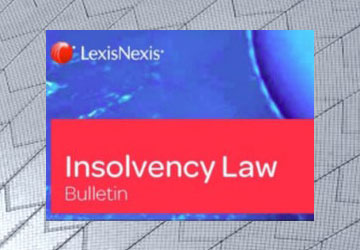Third-party funding in insolvency scenarios – Singapore
Since the implementation of the Insolvency, Restructuring and Dissolution Act 2018 (the IRDA), liquidators and judicial managers in Singapore have been statutorily authorised to use third-party funding for a range of claw-back actions. They are also able to transfer company assets to funders; to assign the fruits of legal actions to funders; and to grant super-priority to funders.
As the use of third-party funding has increased, differing funding propositions have come before the Singapore Courts, and the resulting judgments have added clarity and increased market confidence. Here is a summary of the key points that arose in 2023.
Re Kirkham International Pte Ltd (in liquidation) [2023] SGHC 83
This case concerned an application to remove and replace liquidators and/or directions as to the conduct of administrative steps within the liquidation. While the case does not centre on the law regarding third-party funding agreements, it confirmed that the decision by a liquidator not to obtain Court or Committee of Inspection approval of a third-party funding agreement will not render that funding agreement unenforceable.
At ¶48 of the judgment, Goh Yihan JC noted that the “IRDA does not mandate that all funding agreements must be approved by the court or the [Committee of Inspection]. Thus, while it may have been ideal for the Liquidator to seek the approval of the court or the [Committee of Inspection], I find that the Liquidator did not fail to do something that was statutorily expected of him in relation to the funding agreement.”
While this is a helpful confirmation, it applies only to funding arrangements that fall within certain categories, as discussed further below. Often, liquidators and third-party funders will agree that the Court’s approval of a proposed funding agreement is a condition precedent to the agreement in any event.
Re Dextra Partners Pte Ltd (in liquidation) [2023] SGHC 131
This case concerned a funding arrangement that was proposed to allow the liquidators of a company and a trustee in bankruptcy to conduct investigations into the affairs of the company and of its former director and shareholder, by then also an adjudged bankrupt, respectively. The proposed funder was a judgment creditor of both the company and the bankruptcy estate. The liquidators and the trustee applied for approval of the funding agreement. The liquidators in particular sought:
(a) permission of the Court for the funder to purchase the company’s assets in terms of the subject funding agreement; and
(b) sanction of the Court for the funder to derive a profit in terms of the subject funding agreement.
In a detailed judgment, Chua Lee Ming J provided guidance on sections 144(1)(g) (Powers of liquidator (exercisable with authorisation of the Court or Committee of Inspection)) and 144(2)(b) (Powers of liquidator) of the IRDA, which were applicable given the jurisdiction invoked by the liquidators’ applications.
At ¶18, and having noted that Court approval would often be a condition of a third-party funding agreement, irrespective of whether it was mandated by statute, the Honourable Judge noted that “where authorisation is sought for a sale under s 144(2)(b) of the IRDA, the factors to be considered by the court would be similar to those in an application for authorisation under s 144(1)(g) of the IRDA”, and that those factors would include:-
- Whether the liquidator is acting in good faith (being an overarching consideration).
- Whether the sale or assignment is in the interests of the company and its creditors.
- Whether the funding agreement conflicts with any public policy.
- Whether the terms of the funding agreement conflict with any written law, in particular, the IRDA and the regulations made thereunder.
At ¶¶20-45, the Honourable Judge applied these criteria to the facts of the case, while expanding on what they might mean in practical terms. The following summarised points will be of interest to funders, insolvency practitioners and lawyers:-
- Where investigations are necessary in order to identify and, where appropriate, pursue claims, and where no other means of funding is available, the good faith of the liquidator is likely to be established. In practical terms, this will mean that a liquidator should be prepared to provide evidence as to the lengths they have gone to, or indeed been unable to go to due to lack of funds, in order to identify potential causes of action; and as to the steps they have taken to try to obtain funding.
- When considering whether a funding agreement is in the interests of a company and its creditors, the Court will not just look at the potential upside; it will also consider whether decisions about whether to pursue, settle, or discontinue claims have been improperly relinquished to the funder. In practice, it is unlikely that sophisticated parties would be unaware of this fundamental imperative: most well-drafted funding agreements will contain clear provisions regarding the limited extent to which the funder can influence strategic decisions. Moreover, as seasoned litigators, insolvency practitioners and sophisticated funders will be well aware of the insolvency practitioner’s need to preserve their discretion and autonomy, and to have regard to the views of the Committee of Inspection.
- While discussing the economics of funding agreements, the Honourable Judge observed that the multiplier (being a common method of calculating the funder’s return) would be around the lower end of the scale in cases involving the pursuit of specific claims; whereas for arrangements involving the funding of investigations and subsequent pursuit of potential causes of action, the multiplier would be at the higher end of the scale, because the risk undertaken by the funder would be higher: i.e. the investigations may not result in any viable claims and the timeframe for potential recoveries would be longer. While this is an astute observation, sophisticated funders will likely be happy to discuss ways in which risks can be managed via the deployment of portfolio funding, through which a number of claims in a liquidation could be funded, with the high or unknown risks of some effectively hedged against the lower perceived risks of others.
- Whether or not there is any conflict with written law was particularly relevant in Dextra because the proposed funder was also a member of the Committee of Inspection of the company in liquidation. This meant that there was the risk of the occasioning or perception of a conflict of interest. Given that members of a Committee of Inspection occupy a fiduciary position which ought to prevent them from deriving a profit, or otherwise benefitting from that role to the detriment of other creditors, it is foreseeable that one could use this position to obtain a position of advantage over other creditors. It is for that reason that permission for the funder to derive a profit, was expressly sought as part of the liquidator’s application.
Re Kams Singapore Pte Ltd (in compulsory liquidation) [2023] SGHC 250
In this case, funders applied for an order that the funding arrangement entered into between them, and the company’s liquidator be afforded priority over claims of other creditors of the company pursuant to section 204(3) (Funding by creditors) of the IRDA. In granting the application, at ¶18 of the judgment Chua Lee Ming J set out a non-exhaustive list of factors to be considered by the Court when determining such applications:-
- Whether the advantage to be given to the funding creditor is reasonable, taking into account the funding or indemnity to be provided and the level of risk to be undertaken. It follows from this that the complexity of the proceedings would be a relevant factor in assessing the level of risk.
- Whether the other creditors were given an opportunity to provide the funding or indemnity.
- Whether there are any objections from the other creditors, the liquidator or the Official Assignee in Singapore. The Honourable Judge noted that it would be unlikely that there would be objections from the liquidator since any proposed funding or indemnity would ordinarily be negotiated and agreed upon with the liquidator first.
- Whether the liquidator retained control over the intended proceedings.
These criteria will cohere with the best practices followed by many practitioners already, but it is nonetheless welcome to have such a clear precedent. It is also helpful that, although the above list is described by the Judge as ‘non-exhaustive’, it still marks a refinement of the criteria that had been established in Re Sunmax Global Capital Fund 1 Pte Ltd (in compulsory liquidation) [2022] SGHC 312 less than one year prior.
Re Liquidators of oCap Management Pte Ltd [2023] SGHC 316
In this case, Aedit Abdullah J was required to balance the weight to be given to a request from a foreign Court for assistance (in the form of recognition of a confiscation order made in criminal proceedings overseas) against the powers and duties of a Singapore liquidator regarding the assets of a company over which they were appointed: in essence, could the rights said to be conferred by the foreign confiscation order effectively trump those of the Singapore liquidators, in respect of assets situated in Singapore.
While it did not concern a third-party funding agreement, the Honourable Judge made an interesting comment at ¶70, while describing the factors the Court might consider in weighing such an application:
“the question of whether the liquidator has access to third-party funding informs the court’s assessment of what is necessary to keep the liquidation process afoot. If there is access to third-party funding, it follows that the value of the company’s realisable property that is to be shielded from a restraint order would be adjusted downwards. This is because the company would need to liquidate less of its own realisable property in order to pay for the expenses of the liquidation process.”
This comment shows how comfortable the Courts in Singapore have become with third-party funding – not just as a means of funding litigation that might arise within insolvent scenarios, but for facilitating the ongoing work of insolvency practitioners.
Re Hyflux Ltd (in compulsory liquidation) and others [2023] SGCA 43
This decision from the Singapore Court of Appeal confirmed that an undertaking provided by a third-party funder sufficed as a method of providing security for costs. Although taking care to note that each case would be fact-specific, the Court noted at ¶39 that it should be slow to prioritise “conventional modes of security over alternative forms”.
There is an increasing array of products available to litigants who want to deploy capital usefully rather than paying it into Court or tying it up in a litigation contingency budget. Sophisticated litigation funders and insurers continue to develop innovative ways to help parties manage their capital better – before and during proceedings. It is encouraging that the Singapore Courts recognise that well-organised, well-funded parties should be able to deploy well-conceived solutions.
The landscape in Singapore
With the litigation finance landscape continuing to evolve in Singapore, these cases don’t just provide welcome guidance for local practitioners; they also demonstrate the Judiciary’s pragmatism and give reassuring insight into the commercial way that the Singapore Courts will look at insolvent scenarios. There is an increasing pattern of responsiveness to market exigencies; speed in the production of judgments; and clear lines of authority, which will continue to drive Singapore’s status internationally as a reliable and stable jurisdiction for debtors and creditors.
LCM
LCM does not just provide standard litigation funding – it also provides funding for work throughout insolvency processes, including pre and post-appointment work; asset-securing work; cross-border assistance and recognition work; investigations work and resulting antecedent transaction claims; and actions against former directors and service providers, as well as ordinary causes of action that arise within insolvency processes.
Niall Hanna is an Investment Manager at LCM. He specialises in complex cross-border Restructuring, Insolvency & Dispute Resolution and his focus is APAC, England & Wales, and Offshore.




